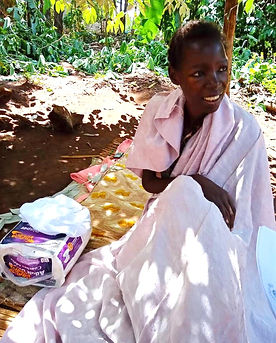Elimination, Early Prevention and Treatment of Cervical Cancer




Cervical cancer is the leading cause of cancer death in Uganda, comprising 20% of all new cancer cases. In 2024, 47% of women enrolled at RHHJ had cervical cancer, while 26% had breast cancer. Combined, these two diseases accounted for 72% of cases among women enrolled with cancer – and 114 women died of these two diseases, with 20 additional deaths from other cancers in the female reproductive system.
Cervical cancer can be prevented with HPV vaccine, and both cervical and breast cancers can be screened and diagnosed early and treated.
Recognizing this, Rays of Hope Hospice Jinja (RHHJ) has fully embraced the WHO strategy for accelerated elimination of cervical cancer.
HPV Vaccination
Primary Prevention
.jpg)
To address the low uptake of HPV vaccination, RHHJ initiated a pilot advocacy program in Buikwe District in 2023, later expanding to Buyende District.
Through advocacy and education of all stakeholders, HPV vaccination uptake is increasing rapidly. This initiative led to a remarkable 358% increase in HPV vaccinations.
In 2024, RHHJ supported the vaccination of more than 10,000 girls for HPV. Our goal is to extend this life-saving program across the entire Busoga Region.

Screening for Cervical and Breast Cancer
Secondary Prevention

RHHJ launched free cervical and breast cancer screenings in 2018. The screening day starts with health education about cervical and breast cancer and HPV vaccination. RHHJ teams set up mobile clinics anywhere - at health centers, schools, churches, or private homes. Following cervical cancer screening using the VIA method, women receive manual breast examinations and are educated on self-examination.
In 2024, we conducted 67 community outreach events (averaging more than one per week), screening 3,253 women. 6.4% (1 in 16 women) were diagnosed with pre-cancerous lesions or suspected cervical cancer, and 3% with suspicious breast cancer.

Treatment or palliative care for cervical cancer cases
Tertiary Prevention
RHHJ strongly supports the test and treat strategy, and therefore treats positive pre-cancerous lesions on site and helps women with suspected cancerous lesions or breast lumps access further diagnosis and treatment as needed. Palliative care is provided to women with advanced disease.

The Harsh Reality


Both of these women had advanced cervical cancer, and at just 53 and 27 years old, both of them died from this completely preventable disease, leaving behind their children and families. The disease stripped them of their dignity, caused them immeasurable pain and suffering and it could have been prevented.
“By eliminating cervical cancer, countries in Africa will contribute to addressing gender inequality and poverty as well as make progress towards the goal of Universal Health Coverage, aligning with the overarching principle of the 2030 Agenda for Sustainable Development of ‘leaving no one behind’.”
Source: WHO & UIIC - Cervical cancer elimination in Africa: where are we now and where do we need to be?
